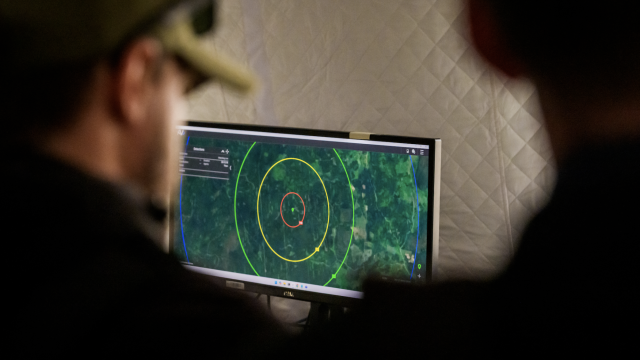After United Nations Resolution 1973 was approved on March 17, giving the green light to the new “coalition of the willing” to bomb Libya, the international community — including Russia and China, which abstained on the resolution vote — started to recoil. Once the bombs began hitting Tripoli, many countries expressed their regret over their initial support or abstention.
No wonder. It turns out that the initial goal of “protecting civilians” has led to cruise-missile attacks that predictably resulted in the deaths of the very civilians the international community wanted to protect. The world watched in horror.
But the reaction of a large part of the international community that has expressed shock and indignation at the results of the Western coalition’s operation in Libya is hypocritical. The tragic consequences of the military operation should have been clear to everyone the moment the resolution was passed.
Can the United States and its allies defend civilians in Libya by dropping bombs on other civilians? Should civilians in Benghazi be defended, while those in Tripoli experience the impact of 1,300-kilogram Tomahawks missiles ? For the Western coalition, the answer is definitely “yes.”
Of course, the Western coalition’s real goal in Libya is not to defend civilians anywhere in the country. It is regime change — to topple Libyan leader Moammar Gadhafi, even though he is the recognized leader of the country, the chairman of the African Union and someone who has been received with honors in Paris and Rome.
But no leader can openly state that the coalition’s goal is regime change. It is classic political theater, with the audience all over the world knowing the predictable, familiar plot, while it pretends that the military intervention is legitimate and internationally sanctioned.
We have seen this approach many times before. Every time, the United States takes a trigger-happy approach to solve unrest in foreign countries caused by complicated social, political and economic problems.
In 1999, Belgrade was also destroyed by NATO ostensibly to protect civilians in Kosovo.
And then there was Iraq. When the United States did not find any weapons of mass destruction there, Vice President Dick Cheney explained to the World Economic Forum in Davos in 2004 that the real U.S. goal was to bring democracy to Iraq and to defend the Iraqi people from Saddam Hussein. In 2010, international human rights organizations claimed there have been more than 100,000 civilian deaths in Iraq. Other sources claim the figure is even higher. Even the lower figure exceeds by far the number of innocent victims under Hussein’s 35-year rule.
In Libya, as in Iraq, “protecting civilians” is just an empty slogan that tries to mask Western geopolitical goals.
Journalist Ramon Lobo put it well in El Pais: “The wars in Afghanistan and Iraq also started from noble words and slogans and outright lies. … To kill or not to kill Gadhafi — that is the question.”
Interestingly enough, U.S. concerns over the deaths of civilians seems to differ from country to country. For example, the lives of civilians in Benghazi seem to be extremely important, but the U.S. administration shows little concern for the lives of civilians in Afghanistan, who are being killed by U.S. troops on a regular basis.
In addition, it didn’t bother the White House at all when Georgian President Mikheil Saakashvili, who was supported by the United States, started shelling South Ossetia in August 2008, killing about 300 civilians. But when Russia moved its troops over the border to protect civilians from Georgian shelling, the United States accused Russia of military aggression. Apparently, civilians in South Ossetia are not as important as those in Benghazi.
We also were told repeatedly that Gadhafi forces have killed up to 6,000 civilians in the ongoing civil conflict. But is there any proof of this? Where are the 6,000 bodies? Do they exist? On March 18, the day before Operation Odyssey Dawn began, Euronews reported from Benghazi that only 10 civilians had been killed since the beginning of the anti-Gadhafi protests. This is also a tragedy, but this is a far cry from the thousands of victims that Western newspapers have reported.
Another important question: Who are all those people we see on television reports who are operating tanks and firing machine guns? Are they innocent civilians or well-trained combatants taking part in a civil war?
If the West really wanted to stop the bloodshed in Libya — and not contribute to it — it should have sent an UN commission to Libya to determine the real situation on the ground, including the number of civilian deaths, and not base its conclusions on unreliable media reports about Gadhafi’s “carnage.” Gadhafi and other Libyan leaders repeatedly called for an independent UN commission because they had nothing to hide. Why did the West not take him up on his plea? If the Western reports of Gadhafi’s carnage were, in fact, true, a UN commission would have been a perfect opportunity to prove to the world that the Gadhafi regime was guilty of killing thousands of its own people. But such a commission was not even considered.
If the West truly wanted to protect civilians in Libya, it should have at the very least offered to broker a truce and start negotiations between the two sides in the civil conflict. But Western leaders dismissed this option outright.
The United States and its allies opted for its standard military solution to the Libyan unrest as if it were the only option available. Moreover, it pressured the nine other members of the UN Security Council to vote in favor of Resolution 1973. As a result, the West has started yet another unnecessary war. It is a war without clear goals — or, more accurately, it does have clear geopolitical goals, but the West can’t admit them openly.
Just as in Afghanistan and Iraq, civilians are being killed every day, but until recently we heard little, if anything, about them from their official military reports. When the West ostensibly fights for “democracy” and leads “humanitarian operations” but is really only fighting for oil, civilian deaths seem to be dispensable. In the U.S. and NATO bureaucratic lexicon, these civilian deaths are called “collateral damage” — or, as French President Nicolas Sarkozy might have put it more elegantly, “quantite negligeable.”
Alexei Pushkov, who was a speechwriter for Mikhail Gorbachev from 1988 to 1991, is anchor of “Postscript,” a political show on TV Center, and a professor of diplomacy at the Moscow State Institute of International Relations.
A Message from The Moscow Times:
Dear readers,
We are facing unprecedented challenges. Russia's Prosecutor General's Office has designated The Moscow Times as an "undesirable" organization, criminalizing our work and putting our staff at risk of prosecution. This follows our earlier unjust labeling as a "foreign agent."
These actions are direct attempts to silence independent journalism in Russia. The authorities claim our work "discredits the decisions of the Russian leadership." We see things differently: we strive to provide accurate, unbiased reporting on Russia.
We, the journalists of The Moscow Times, refuse to be silenced. But to continue our work, we need your help.
Your support, no matter how small, makes a world of difference. If you can, please support us monthly starting from just $2. It's quick to set up, and every contribution makes a significant impact.
By supporting The Moscow Times, you're defending open, independent journalism in the face of repression. Thank you for standing with us.
Remind me later.






